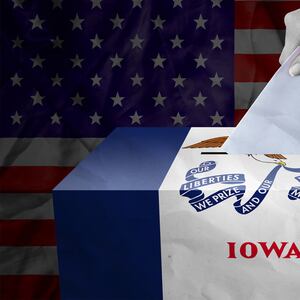The Iowa caucus system is one of those ideas that seems sort of charming if you think about it for five minutes—a bunch of neighbors getting together in America’s most literate state, the one that gave us Jean Seberg and The Music Man—and utterly insane if you think about it for ten minutes. No secret ballot so you’re standing across from your boss when you vote, no early voting and doors close at 7 p.m. so if you stop for gas your vote doesn’t count, all in a state that doesn’t remotely resemble the American electorate as a whole.
I worked the Iowa caucus on the Republican side from 1996 to 2012 (though there really wasn’t one on that side in 2004) and am pretty much a fan boy for the state. I’ve ridden my bike across it in the yearly Ragbrai (I did it with my best friend from Des Moines and instead of taking a week we rode straight through in 24 hours and forgive the obnoxious brag but it was my pal’s idea and he was later killed in the bike Race Across America and I miss the guy.) I’ve followed Senator Chuck Grassley around with a camera on his yearly visit to all 99 counties, and at various points it seems like half of my friends were Iowa Writer Workshop veterans.
But just because I have a soft spot in my heart doesn’t mean I have one in my head. It’s a nutty system no school would sanction to choose a student body president.
My first introduction to the Iowa Caucuses was in 1995 when I went to Iowa to film a town hall for Bob Dole. We’d picked a classic high school gym that was straight out of Hoosiers and invited supporters to come with only one request: We are filming this but please don’t dress up.
So I show up with a full film crew and almost everybody is in their Sunday best. It looked like we were hosting a wedding reception, not a town hall. It was a disaster. Which is how I ended up at a nearby Wal-Mart buying $2,000 of sweaters and sweatshirts. (The manager came out and personally thanked me.) Back at the gym as we handed out the clothes, everybody could not have been nicer—not a given when you are telling somebody you don’t like what they are wearing—and when we told them they could keep the clothes, seemed genuinely touched. They asked smart questions too. How great is that?
On the Republican side, the caucus is pretty much a straightforward system: People show up, they raise their hands for their candidate, somebody counts and the totals are called in to Republican state headquarters; whoever has the most votes wins. But for some reason, the Democrats utilize a bizarre system of ranked voting that eliminates candidates in a process that more resembles The Bachelor than this thing we like to call democracy.
Both party’s caucuses are amateurish affairs run by volunteers. In 2012, Mitt Romney appeared to win by a few votes the night of the caucus, but weeks later Rick Santorum was declared the official winner. (As we said in Romney world, we won it when it mattered.) Last night, the Democratic system melted down.
While everybody complains about the quirks of a nominating process, what most people fail to grasp is that a political party can choose their nominee in any manner the party so desires. There is no difference legally between a bowling club selecting a president and the Republican and Democratic parties selecting a nominee. For all the recent Republican bluster about how our Founding Fathers wanted to avoid a partisan impeachment, the Constitution doesn’t mention parties because they didn’t exist. Libertarians pick their candidates at a national convention.
The dirty little secret is that the Iowa caucuses, like the New Hampshire primary, are a big business. No Chamber of Commerce could come up with a scheme to get tens of thousands of people to visit Iowa and New Hampshire in the winter and spend millions of dollars. But a couple of local political parties did, and they will fight like hell to keep their gravy trains rolling.
And it’s not just money. Say you are a social studies teacher and you’d like your students to meet every presidential candidate? In Iowa and New Hampshire that’s easy. In these states, every four years presidential candidates court a county party chairman like college coaches recruiting superstar high-school athletes. Guess what? That’s a nice feeling. It’s fun and makes life more interesting.
But there is ample evidence that selecting a president of the United States should be taken as a serious endeavor run by serious people with serious intent. I’ve worked all over the world in elections and most functioning democracies do this election thing far better than Americans. Last night a friend I’d worked with in the Congolese elections messaged me asking if I could explain Iowa. It was awkward.
This is not a difficult problem to fix. This is not climate change. All that is required to bring fairness and sanity to a nominating system is for political parties to summon a modicum of courage and common sense to organize a system of multi-state nominating elections with a broad cross section of the American electorate. OK, maybe that does make it hopeless.
But there’s something to this notion that insanity is continuing to do the same thing and expecting different results and maybe, just maybe, this latest debacle will end the quaint madness.






